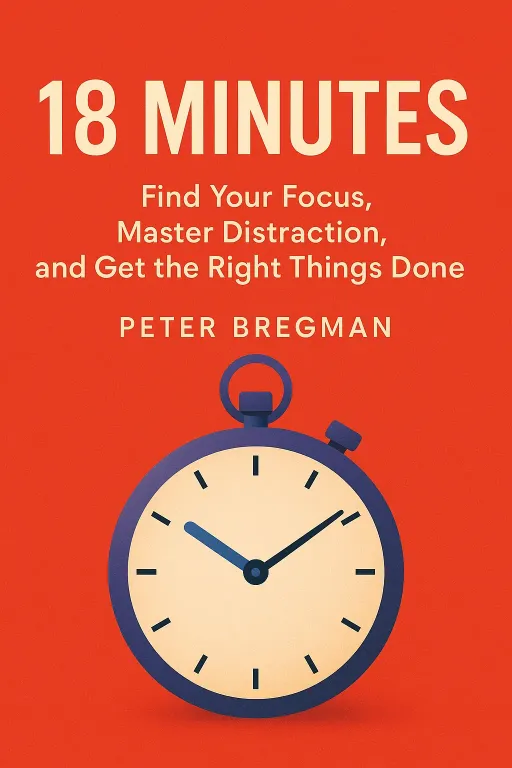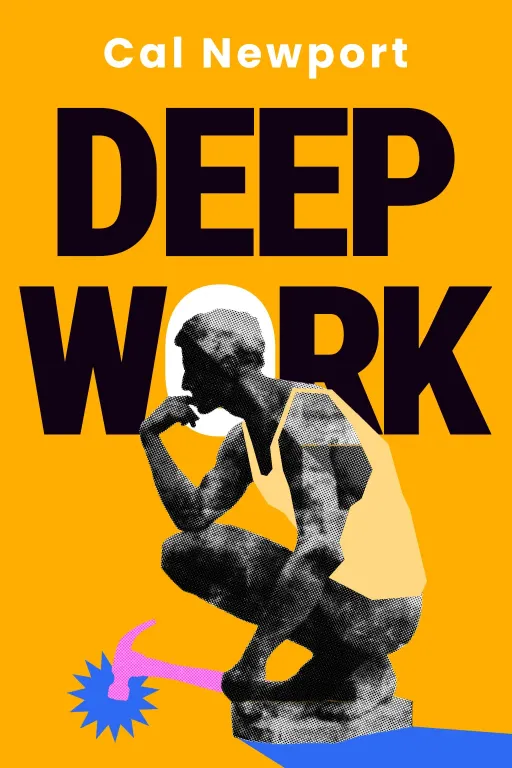
18 Minutes
10 minFind Your Focus, Master Distraction, and Get the Right Things Done
Introduction
Narrator: Imagine it is your first day at a new, high-stakes job. You are Molly, the new head of learning and development at an investment bank. You sit down at your desk, full of hope and ready for a fresh start. You log in, open your email, and your heart sinks. There, waiting for you, are 385 unread messages. Before you have even begun, you are already behind. This feeling of being perpetually overwhelmed, of being busy yet unproductive, is a modern epidemic. We are constantly pulled in a thousand directions, reacting to the urgent while the important gets pushed aside.
This is the central problem that author Peter Bregman tackles in his book, 18 Minutes: Find Your Focus, Master Distraction, and Get the Right Things Done. He argues that the solution is not to work faster or longer, but to pause, gain perspective, and apply a structured, intentional approach to managing our year, our day, and each moment within it.
The Power of the Pause
Key Insight 1
Narrator: Before one can manage time, one must first stop the frantic momentum of daily life. Bregman illustrates this through his own story. After building a successful consulting firm, his business crashed during the dot-com bust. This forced stop, while painful, gave him a chance to re-evaluate everything. He realized that despite his financial success, he had not been happy. He was so focused on moving forward that he never stopped to ask if he was moving in the right direction.
This experience taught him the necessity of the "pause." It is a deliberate act of slowing down to get a bird's-eye view of one's life. Bregman compares this to a child playing in a pool who yells "PAUSE!" when the game gets too intense. That brief interruption allows for a reset. In life, this pause allows our rational prefrontal cortex to override the amygdala's fight-or-flight response, leading to more thoughtful decisions. It is about seeing the world as it truly is, not as we expect it to be, and expanding our view of ourselves beyond a single identity, like our job. The tragic suicides at France Telecom, where employees felt their entire identity was tied to a job undergoing a stressful reorganization, serve as a stark warning against this. By pausing, we can reconnect with our potential and ensure our actions align with our desired outcomes.
Define Your Year by the Four Elements
Key Insight 2
Narrator: Once a person has paused, the next step is to define a clear direction for the year. Bregman argues that the most fulfilling and successful path lies at the intersection of four key elements: leveraging strengths, embracing weaknesses, asserting differences, and pursuing passions. Instead of trying to be a well-rounded, generic version of a successful person, he advocates for designing a life that plays to one's unique, and sometimes quirky, nature.
To leverage strengths, one must play a game they can win, even if it means inventing it. The Oakland A's "Moneyball" strategy is a prime example; unable to compete on salary, they reinvented the game by focusing on undervalued statistics. To embrace weaknesses, one must recognize that quirks can be a source of power. A leader's obsessive focus on value, while seemingly a flaw, might be the very reason for their company's success. To assert differences, one must stand out. Bregman tells the story of a pedicab driver in a freezing Central Park who, unlike his shivering competitors, installed and advertised heated seats, ensuring he was busy all day. Finally, to pursue passion, one must focus on what they truly want to do, not what they should do. Captain "Sully" Sullenberger’s lifelong passion for aviation safety, pursued in his spare time, is what prepared him to perform the "Miracle on the Hudson." By identifying five key areas for the year that are built on these four elements, one creates a clear and personal map for success.
Translate Yearly Goals into Daily Action with the 18-Minute Plan
Key Insight 3
Narrator: A yearly plan is useless if it does not translate into daily action. This is where the book's core method, the 18-minute plan, comes into play. It is a simple, daily ritual designed to ensure that one’s time is spent on their chosen priorities. The ritual is broken into three parts.
First, the "Morning Minutes" take five minutes at the start of the day. Before checking email or getting pulled into others' agendas, one reviews their to-do list and schedules specific tasks into their calendar. This act of assigning a "when" and "where" to a task dramatically increases the likelihood of it getting done. Second, "Refocus" takes one minute every hour. A recurring alarm serves as a prompt to pause, take a deep breath, and ask if the last hour was productive. This hourly check-in prevents the day from derailing and allows for quick course corrections. Finally, the "Evening Minutes" take five minutes at the end of the workday. This is a time to review the day, assess what was accomplished, identify lessons learned, and quickly plan for the next day. This entire process, totaling just 18 minutes, creates a powerful structure for getting the right things done.
Master Distraction by Choosing What to Ignore
Key Insight 4
Narrator: In our hyper-connected world, the greatest challenge to following a plan is distraction. Bregman argues that to get the right things done, choosing what to ignore is as important as choosing where to focus. He tells a story of being late for a meeting with a CEO. While riding the elevator, Bregman was so engrossed in emailing the CEO from his phone that he got off on the wrong floor, only to be corrected by the very CEO who was standing right next to him. The CEO then shared that at a recent "Entrepreneur of the Year" event, he was the only finalist not glued to a mobile device. He was present, focused, and deliberately ignoring the digital noise.
This illustrates the power of creating an "ignore list." While we all have to-do lists, few of us consciously decide what we will not do. This means ignoring emails that are not critical, declining meetings that do not align with our five annual goals, and resisting the urge to switch-task. Research from the Virginia Tech Transportation Institute found that in 80 percent of car crashes, drivers were distracted in the three seconds prior. The same principle applies to our work and lives; a small distraction can cause us to crash. Mastering distraction requires mastering our boundaries and saying "no" so we can say "yes" to what truly matters.
Find Your One Thing for Maximum Impact
Key Insight 5
Narrator: After laying out a comprehensive system, Bregman concludes with a powerful call for simplification. He argues that the most effective way to create change is to focus on a single, high-leverage behavior. He shares the story of a large retail chain that had identified ten "Gold Behaviors" for its sales associates. Despite mystery shoppers finding that employees were exhibiting nine of the ten behaviors, sales were not increasing.
Bregman investigated and discovered that every associate was skipping the same behavior: measuring customers for a proper fit. It was the one action that felt awkward and time-consuming. He instructed the company to forget the other nine behaviors and focus all training and incentives on that single action. The result? Sales shot up. The lesson is that we do not have ten gold behaviors; we have one. Whether it is losing weight by cutting out sugar or improving leadership by focusing only on communication, identifying and committing to the single most impactful change is the secret to making progress.
Conclusion
Narrator: The ultimate takeaway from 18 Minutes is that a fulfilling and productive life is not an accident; it is the result of deliberate, conscious choice. In a world that constantly vies for our attention, the greatest power we have is the power to decide where that attention goes. The 18-minute ritual is not just a time management technique; it is a daily practice in intentionality.
The book's most challenging idea is not the system itself, but the courage it demands. It requires the courage to pause when everyone else is rushing, the courage to say "no" to good opportunities in order to pursue great ones, and the courage to admit that we cannot do it all. The final question it leaves us with is not "How can I get more done?" but rather, "What is the one thing I will choose to do that will make all the difference?"









